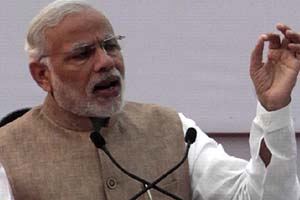Given the acrimony between the principal political parties, Prime Minister Narendra Modi has done well to reach out to Congress President Sonia Gandhi and former prime minister Manmohan Singh in an attempt to get them to see reason. Even if this doesn’t break the ice on GST, this should have been done a long time ago, considering how, with frequent elections, the language being used by top political leaders to describe one another has descended to very low levels – in such an atmosphere, no reasonable discourse is possible on anything of critical import. It is also good that the government has agreed to a discussion on intolerance since this allows it to place on record the facts on communal tension – the record clearly shows incidents of communal violence have been taking place with alarming regularity, even when the Bharatiya Janata Party (BJP) was not in power at the Centre or in various states; so while it is true the prime minister has not done enough to pull back the hate-mongers in his party, it is also not true that the BJP is to blame for every act of communal tension in the country.
While reaching out to the Congress is one thing, succumbing to its blackmail is quite another. Though the government is keen to have a big ‘reform’ like GST under its belt, it cannot accept something it will regret later. The fact is no statute, such as the Income Tax Act for instance, can put in a ceiling or a floor rate like the Congress wants – the Congress GST Bill didn’t have it either. For one, it ties the government’s hands and, even in an emergency, the rate cannot be raised. What happens if there are huge revenue shortages at the 18% revenue-neutral-rate – does the Congress think the Centre has unlimited coffers to be able to subsidise this forever? In any case, even if the BJP does agree to an 18% rate, this is based on there being a single rate for all commodities – if the BJP agrees to what the Congress wants, it may have to go back to each state to get its approval since most states are looking at a 2 or 3-part GST structure with a lower rate for goods used by the common man. How high the revenue-neutral rate is also depends on what is kept out of the purview of GST – if large chunks of the economy are kept out of its purview, how are taxes to be collected? In any case, it is obvious the only thing the Congress is interested in is scoring points. Which is why, one of its earlier proposals was to reduce the central government’s voting share in the GST Council to 25%, to ensure the Centre could never veto anything the states wanted, no matter how populist this was. Indeed, it is the states that are preventing various sectors like real estate and alcohol from being included in the GST – this is something the Congress wanted included under the purview of GST. Ironically, after wanting to weaken the Centre in the Council, the Congress now wants a dispute resolution process within the GST Council – this is one of its so-called three inviolable principles. The very principle of GST and inter-state taxation rules, however, is to have political consensus, not to have a quasi-judicial process take over.
While negotiating with the Congress president and former prime minister, the government has to make it clear it is not going to succumb to blackmail. In any case, GST is not a reform that is going to deliver great results, or tax buoyancy, overnight – the fact that the Centre is agreeing to compensate states for five years suggests it will take at least that long for the required results to accrue. There are issues of how to tax services and production – one has a threshold of Rs 1 crore below which no one is taxed and the other has a Rs 10 lakh threshold – without unleashing an inspector raj; getting together a computerized tax base that will capture all transactions – that is how revenue-buoyancy will take place – will also take time, as will getting states to agree to bring in more sectors under GST. It is better to not have a GST than to have a flawed one. And, if the BJP’s claim that it has the support of 30 of 32 political parties is correct, the Congress party will stand badly exposed.

